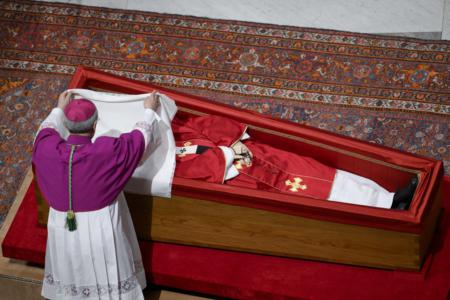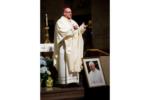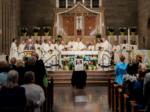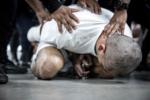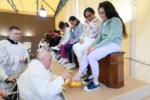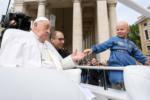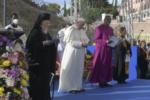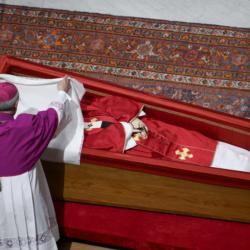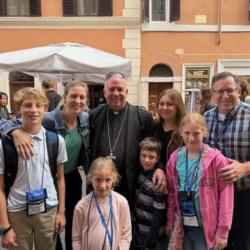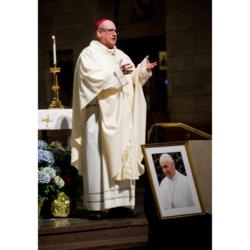Lebanese patriarch beatified as political tensions rise in the country
(OSV NEWS) -- Amid concerns of impending conflict, Catholic clergy and political leaders drew together in Lebanon to celebrate the joyful beatification of Patriarch Estephan El Douaihy (also known as Istifan al-Duwayhi) -- a 17th-century scholarly prelate who fashioned the Maronite Church and helped to build the country.
Lebanese Cardinal Bechara Rai, patriarch of the Maronite Catholic Church, presided over the Mass with papal representative Cardinal Marcello Semeraro, prefect of the Dicastery for the Causes of Saints, Aug. 2 in Bkerké.The breathtaking nighttime ceremony, which took place in the courtyard of the Patriarchal See, located north of the capital, Beirut, drew several thousand attendees. The Maronite Catholic Church is in full communion with Rome.
The beatification took place as the United States and others urged Iran to limit its promised military retaliation against Israel over the recent assassinations of Palestinian Hamas leader Ismail Haniyeh and Lebanese Hezbollah military commander Fuad Shukr.
Hezbollah, an Iranian proxy, has engaged in border reprisals with Israel over the war in Gaza since October. Many Lebanese Christians resent what they say is Hezbollah dragging Lebanon, already suffering from a dire economy and political instability, into a devastating conflict.
Lebanon's caretaker, Prime Minister Najib Mikati, and many political leaders and government officials were present to hear the story of the man who was both an extraordinary scholar of history and a pastor.
The hope, Cardinal Semeraro stressed during the beatification Mass, is that the legacy of Blessed Douaihy’s life may encourage modern-day Lebanese to seek out and trust God, and to press forward beyond the hardships they encounter.
Blessed Douaihy "was Patriarch of the Maronite Church for more than 30 years," including "in difficult times of external persecution and internal dissensions," Cardinal Semeraro said during his homily Aug. 2. During these long years, "it can be said that he did not know a single day of peace," he said.
The cardinal added that by forgiving others, Blessed Douaihy shared in Christ’s suffering.
During his lifetime, the Ottoman Turks, who controlled the region, tried to suppress those that challenged their rule, yet despite persecution, the saint-to-be remained true to his advocacy for the Maronites and strengthened their community and faith. He also laid vibrant educational foundations for Lebanon.
"There was no bitterness in his heart," Cardinal Semeraro said. To those who had persecuted him, he said: "I forgive you for what you have done to me. I am ready to suffer more for the love of the Lord who suffered and died for me," the Vatican's prefect said in Bkerké.
At only 11 years old, the young Estephan, gifted with a precocious intellect, earned a scholarship to study at the Maronite College in Rome. At the end of his studies, it is said that he could have entered a European university or princely court, but he chose to return to Lebanon, where he opened schools and oversaw the building of churches, eventually becoming the patriarch.
He is credited with seeing three Lebanese monastic orders born, while also bringing order to the Maronite liturgy and worship.
Miracles were attributed to Blessed Douaihy’s prayerful intervention during and after his lifetime.
It is said that at the age of 14, Douaihy lost his eyesight due to his intensive studies in Rome. After praying ardently to the Virgin Mary, he miraculously received restoration of his sight. This experience profoundly affected his personal walk of faith and set him on a course to become a dynamic spiritual leader on a mission for his Maronite community and homeland.
Blessed Douaihy was born in Ehden, Lebanon, on Aug. 2, 1630, and died at 73 in the country’s Kadisha Valley in 1704. The town of Ehden, found in Lebanon’s northern mountains, is also where a miracle accredited by the Vatican for his beatification took place when a woman suffering from HIV-negative polyarthritis was reportedly instantly healed.
Visiting Lebanon at this moment of political tension and fear of full-scale Middle East war, Cardinal Semeraro said in his homily: "The righteous will flourish like the palm tree, will grow like the cedar of Lebanon."
- - - Dale Gavlak writes for OSV News from Amman, Jordan.--
BRIEF: (OSV NEWS) Amid concerns of impending conflict, Catholic clergy and political leaders drew together in Lebanon to celebrate the joyful beatification of Patriarch Estephan El Douaihy (also known as Istifan al-Duwayhi) -- a 17th-century scholarly prelate who fashioned the Maronite Church and helped to build the country. Lebanese Cardinal Bechara Rai, patriarch of the Maronite Catholic Church, presided over the Mass with papal representative Cardinal Marcello Semeraro, prefect of the Dicastery for the Causes of Saints, Aug. 2 in Bkerké. The breathtaking nightly ceremony, which took place in the courtyard of the Patriarchal See, located north of the capital, Beirut, drew several thousand attendees. The Maronite Catholic Church is in full communion with Rome. The beatification came as the United States and others urged Iran to limit its promised military retaliation against Israel over the recent assassinations of Palestinian Hamas leader Ismail Haniyeh and Lebanese Hezbollah military commander Fuad Shukr. Hezbollah, an Iranian proxy, has engaged in border reprisals with Israel over the war in Gaza since October. Many Lebanese Christians resent what they say is Hezbollah dragging Lebanon, already suffering from a dire economy and political instability, into a devastating conflict. The hope, Cardinal Semeraro stressed during the beatification Mass, is that the legacy of Blessed Douaihy’s life may encourage modern-day Lebanese to seek out and trust God, and to press forward beyond the hardships they encounter.
